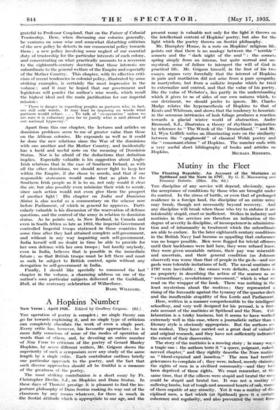A Hopkins Number
New Verse ; April 1935. Edited by Geoffrey Grigson. (6d.) ,
THE operation of poetry is complex ; no single theory can ,go far towards explaining it, 'and no sin' type of criticism .ean completely elucidate the work of even a single poet. Every critic has, however, his favourite approaches ; he is more fully conscious of some of the modes of operation of words than of others, and, by devoting an entire number -of New Verse to criticism of the poetry of Gerard Manley Hopkins, by seven different writers, Mr. Grigson shows the superiority of such a symposium-over any study ,of the same length by a single critic. Each contributor outlines briefly one particular approach to the poetry, and the fact that such diverse approaches should all be fruitful is 'a measure- of the greatness of the poetry.
The most striking contribution is a short essay by Fr. :Christopher Devlin, S.J., on Hopkins and Duns Scotus. hr
these days of Thornist prestige it is pleasant to find the im- portant philosophy of Duns Scotus making its way out of the classroom -by any means whatever, for there is much in the Scotist attitude which is appropriate to our age, and the
present essay -is valuable =not- only for the light it throws on ' the intellectual content of Hopkins' poetry, but also for the light which the poetry throws on Scotist philosophy.
Mr. Humphry House, in a note on. Hopkins'. religious life, points out that there is no analogy between the " terrible-" sonnets and the " dark night of the soul ", : the sonnets spring simply from an intense, but quite normal and -un- mystical, sense of .failure to interpret the will of God in practical life. Mr. Grigson himself, in the first of his two -essays, argues very forcefully that the interest -of Hopkins in pain and mutilation did not arise from a pure sympathy in martyrdom, but from a sadistic impulse -which he tried to externalize and control, and that the value of his poetry, like the value of -Webster's, lies partly in the understanding which it gives to us of sides of our own natures which, to our detriment, we should prefer to ignore. Mr. Charles Madge relates the hyperaesthesia of Hopkins to that of Keats and Whitman,- and shows that the tendency to luxuriate in the sensuous intricacies of lush foliage produces a reaction towards a glacial winter world of abstraction. Andre Bremond, S.J., illustrates a theory of rhythmic inspiration by reference to " The Wreck of the ' Deutschland,' " and Mr. Ll. Wyn Griffith writes an illuminating note on the similarity between the " eynghanedd" of classical Welsh poetry and the consonant-chime " of Hopkins. The number ends with a very useful short bibliography of books and articles on










































 Previous page
Previous page